牛津译林版英语七年级上Unit 6 Food and lifestyle单元复习课件(21张PPT无素材)
文档属性
| 名称 | 牛津译林版英语七年级上Unit 6 Food and lifestyle单元复习课件(21张PPT无素材) | 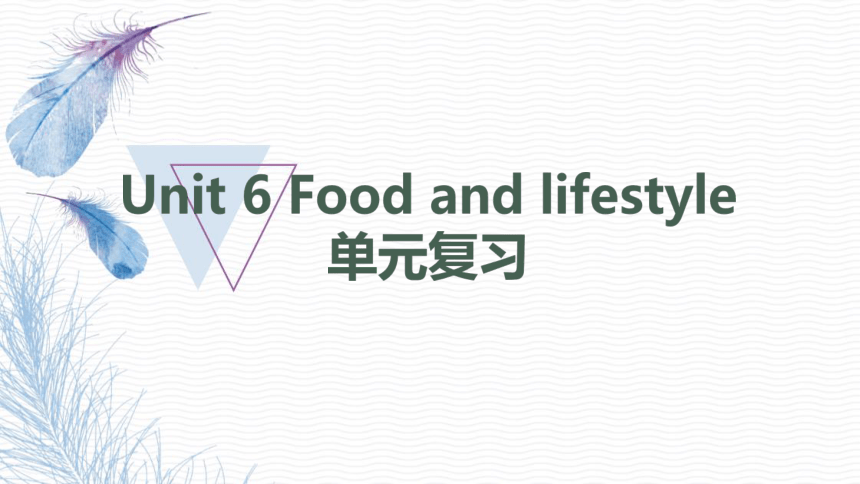 | |
| 格式 | zip | ||
| 文件大小 | 3.4MB | ||
| 资源类型 | 教案 | ||
| 版本资源 | 牛津译林版 | ||
| 科目 | 英语 | ||
| 更新时间 | 2021-12-03 22:36:24 | ||
图片预览

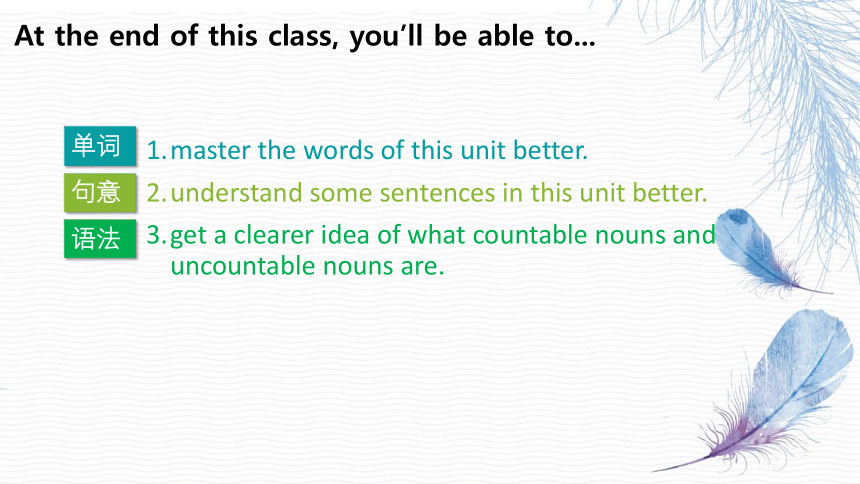
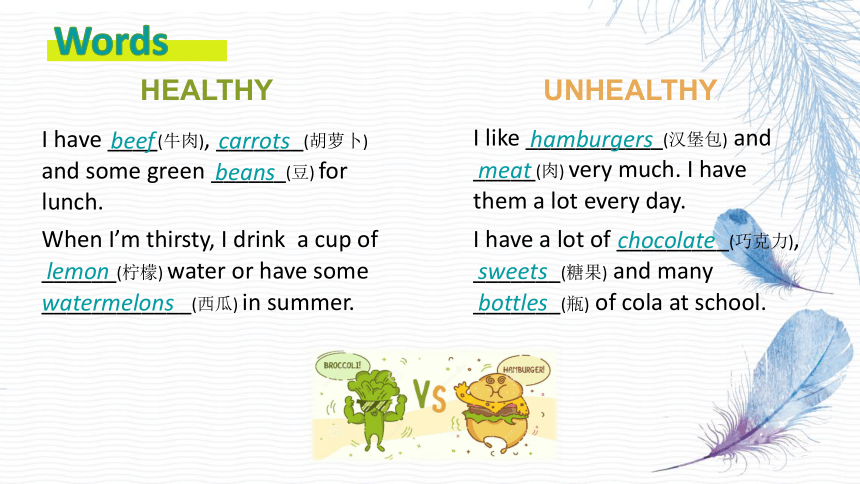
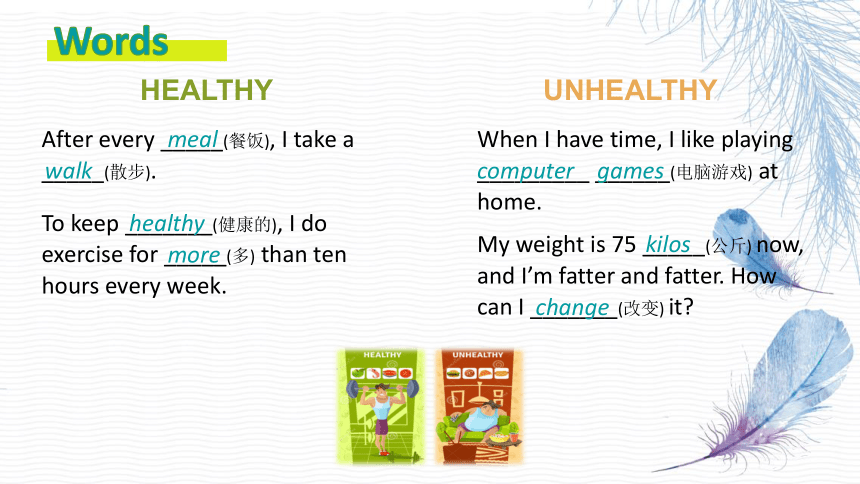
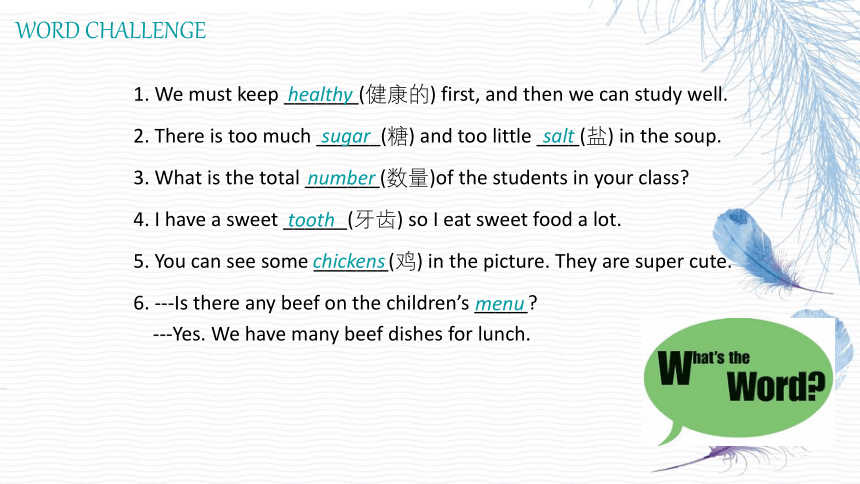
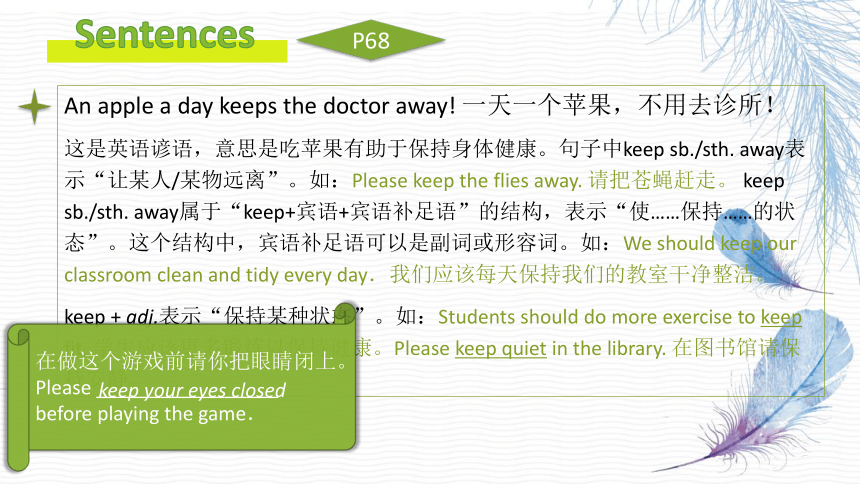
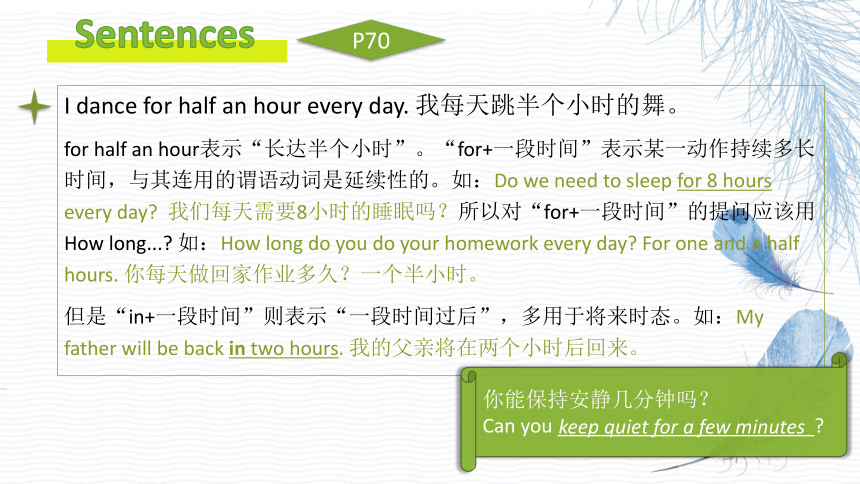
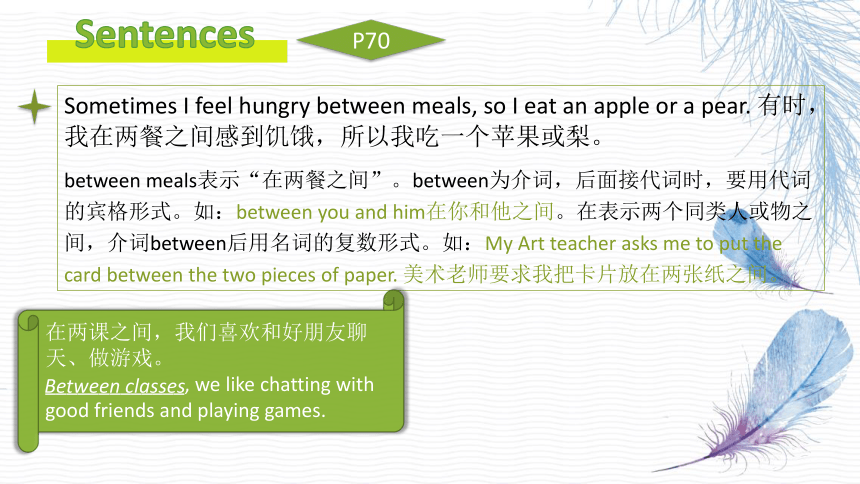
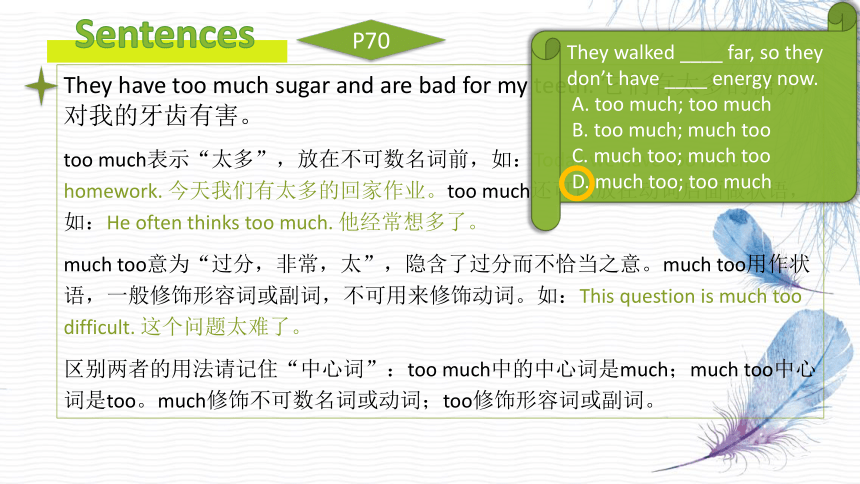
文档简介
(共21张PPT)
Unit 6 Food and lifestyle
单元复习
At the end of this class, you’ll be able to...
master the words of this unit better.
understand some sentences in this unit better.
get a clearer idea of what countable nouns and uncountable nouns are.
单词
句意
语法
Words
HEALTHY
UNHEALTHY
I have ____(牛肉), _______(胡萝卜) and some green ______(豆) for lunch.
When I’m thirsty, I drink a cup of ______(柠檬) water or have some ____________(西瓜) in summer.
I like ___________(汉堡包) and _____(肉) very much. I have them a lot every day.
I have a lot of _________(巧克力), _______(糖果) and many _______(瓶) of cola at school.
beef
carrots
beans
lemon
watermelons
hamburgers
meat
chocolate
sweets
bottles
Words
After every _____(餐饭), I take a _____(散步).
HEALTHY
UNHEALTHY
To keep _______(健康的), I do exercise for _____(多) than ten hours every week.
When I have time, I like playing _________ ______(电脑游戏) at home.
My weight is 75 _____(公斤) now, and I’m fatter and fatter. How can I _______(改变) it
meal
walk
healthy
more
computer games
kilos
change
WORD CHALLENGE
1. We must keep _______(健康的) first, and then we can study well.
2. There is too much ______(糖) and too little ____(盐) in the soup.
3. What is the total _______(数量)of the students in your class
4. I have a sweet ______(牙齿) so I eat sweet food a lot.
5. You can see some _______(鸡) in the picture. They are super cute.
6. ---Is there any beef on the children’s _____
---Yes. We have many beef dishes for lunch.
healthy
sugar
salt
number
menu
chickens
tooth
Sentences
P68
An apple a day keeps the doctor away! 一天一个苹果,不用去诊所!
这是英语谚语,意思是吃苹果有助于保持身体健康。句子中keep sb./sth. away表示“让某人/某物远离”。如:Please keep the flies away. 请把苍蝇赶走。 keep sb./sth. away属于“keep+宾语+宾语补足语”的结构,表示“使……保持……的状态”。这个结构中,宾语补足语可以是副词或形容词。如:We should keep our classroom clean and tidy every day.我们应该每天保持我们的教室干净整洁。
keep + adj.表示“保持某种状态”。如:Students should do more exercise to keep fit. 学生应该更多锻炼以保持健康。Please keep quiet in the library. 在图书馆请保持安静。
在做这个游戏前请你把眼睛闭上。
Please _________________ before playing the game.
keep your eyes closed
Sentences
P70
I dance for half an hour every day. 我每天跳半个小时的舞。
for half an hour表示“长达半个小时”。“for+一段时间”表示某一动作持续多长时间,与其连用的谓语动词是延续性的。如:Do we need to sleep for 8 hours every day 我们每天需要8小时的睡眠吗?所以对“for+一段时间”的提问应该用How long... 如:How long do you do your homework every day For one and a half hours. 你每天做回家作业多久?一个半小时。
但是“in+一段时间”则表示“一段时间过后”,多用于将来时态。如:My father will be back in two hours. 我的父亲将在两个小时后回来。
你能保持安静几分钟吗?
Can you ________________________
keep quiet for a few minutes
Sentences
P70
Sometimes I feel hungry between meals, so I eat an apple or a pear. 有时,我在两餐之间感到饥饿,所以我吃一个苹果或梨。
between meals表示“在两餐之间”。between为介词,后面接代词时,要用代词的宾格形式。如:between you and him在你和他之间。在表示两个同类人或物之间,介词between后用名词的复数形式。如:My Art teacher asks me to put the card between the two pieces of paper. 美术老师要求我把卡片放在两张纸之间。
在两课之间,我们喜欢和好朋友聊天、做游戏。
_____________, we like chatting with good friends and playing games.
Between classes
Sentences
P70
They have too much sugar and are bad for my teeth. 它们有太多的糖分,对我的牙齿有害。
too much表示“太多”,放在不可数名词前,如:Today we have too much homework. 今天我们有太多的回家作业。too much还可以放在动词后面做状语,如:He often thinks too much. 他经常想多了。
much too意为“过分,非常,太”,隐含了过分而不恰当之意。much too用作状语,一般修饰形容词或副词,不可用来修饰动词。如:This question is much too difficult. 这个问题太难了。
区别两者的用法请记住“中心词”:too much中的中心词是much;much too中心词是too。much修饰不可数名词或动词;too修饰形容词或副词。
They walked ____ far, so they don’t have ____ energy now.
A. too much; too much
B. too much; much too
C. much too; much too
D. much too; too much
Sentences
P70
I plan to eat more fruit and vegetables every day. 我计划每天多吃水果和蔬菜。
plan v.意为“计划,打算”。plan sth.表示“计划某事”,plan to do sth.表示“计划做某事”。如:Do the Smiths plan a trip to London 史密斯一家计划去伦敦旅行吗?We plan to have a party for your birthday. 我们打算为你的生日举办一个聚会。
plan n. 还可以用作名词,意为“打算,计划”。如:Thank you for helping me make a study plan! 感谢你帮我制定一个学习计划!.
她计划每周游泳和跳舞。
She __________________ and dance every week.
plans to go swimming
Sentences
P74
Mum, what do we need to buy 妈妈,我们需要买什么?
在这里need做实意动词,和其他实意动词一样,need后接不定式短语,即need to do sth,表示“需要做某事”。变成疑问句时,need不能直接用于句首,需要借助动词do/does/did。如:Does she need any help 她需要一些帮助吗?It’s very cold outside. You need to wear warm clothes. 外面天气很冷,你需要穿暖和的衣服。
need也可以作情态动词,表示“需要,必须”,通常用于否定句和疑问句中。如:You needn’t do it again. 你不需要再做了。Need they stay in the classroom for 2 hours 他们需要在教室里待2个小时吗?
我需要许多能量来度过整个下午。
I ________________ for the whole afternoon.
need lots of energy
Sentences
P75
less than 3 times a week 一周少于三次
less than 表示“少于,小于”,用于数量、时间、金钱、距离等的比较,后面可以接可数名词。如:He has less than ten books. 他有不到十本书。
反义短语为more than“超过,超出”。如:He spends more than two hours watching TV every day. 他每天花费两个多小时看电视。
我一天的睡眠时间不到八小时。
I sleep _________________ every day.
less than eight hours
Sentences
P76
Apple juice tastes good. 苹果汁味道不错。
句中的taste为系动词,意思为“尝起来…”,后面接形容词做表语。如:The pork doesn’t taste very fresh. 这些猪肉吃起来不新鲜了。
在英语中类似的系动词还有look, feel, sound, smell等,我们把这类系动词称为感官动词。如:He looks very tired.他看起来很累。The song sounds beautiful. 那首歌听起来优美。Does the toy cat feel soft 那只玩具猫摸上去柔软吗?The mangoes don’t smell good. 这些芒果不好闻。
这类感官动词后面也可以接介词like,表示“...像...”。如:Low-fat milk tastes like water. 低脂牛奶喝起来像水。
这盘子水果吃起来如何?
_____ does the plate of fruits _____
How
taste
SENTENCE FUN
1. 李华每个下午跑步半个小时。
Li Hua runs for half an hour every afternoon.
2. 他每周末玩手机不超过一个小时。
3. 他喜欢吃汉堡和高糖蛋糕。
4. 他现在计划让不健康的食品远离。
5. 他需要做什么来保持健康呢?
He plays on the phone less than one hour every weekend.
He likes hamburgers and cakes with lots of sugar.
He is planning to keep the unhealthy food away now.
What does he need to do to keep fit/healthy
SENTENCE FUN
1. 李华每个下午跑步半个小时。
Li Hua runs for half an hour every afternoon.
2. 他每周末玩手机不超过一个小时。
3. 他喜欢吃汉堡和高糖蛋糕。
4. 他现在计划让不健康的食品远离。
5. 他需要做什么来保持健康呢?
He plays on the phone less than one hour every weekend.
He likes hamburgers and cakes with lots of sugar.
He is planning to keep the unhealthy food away now.
What does he need to do to keep fit/healthy
SENTENCE FUN
Li Hua runs for half an hour every afternoon. He plays on the phone less than one hour every weekend. He likes hamburgers and cakes with lots of sugar. He is planning to keep the unhealthy food away now. What does he need to do to keep fit
h
And
^
h
But
^
h
However,
^
Grammar
可数名词
可数名词是可以用数目来计算的人或物。
1. 单数:单数名词前可加不定冠词a或an,如果该单词是以元音音素开头的,在其前加an,其余加a,如: a pen, an apple
2. 复数:可数名词的复数形式有规则变化和不规则变化。一般情况下,可以在可数名词单数之后直接加s,构成大多数可数名词的复数,但也有特殊情况:以辅音字母+y结尾的可数名词,变y为i,再加es,如:story – stories。以s,sh,ch或x结尾的可数名词加es,如:class – classes box – boxes dish – dishes bench – benches。以o结尾的可数名词,+es的,如:hero – heroes mango – mangoes,+s的,如:photo – photos。以f或fe结尾的名词,变f为v,再加es或s,如:knife – knives leaf – leaves。少数名词不规则变化:变a为e:man – men woman – women,变oo为ee:tooth – teeth,其他特殊变化:mouse – mice child – children,单复数同形:Chinese, Japanese, sheep, deer
Grammar
不可数名词
不可数名词主要为抽象名词和物质名词,不能直接用数来计算,没有词形变化。如:news,information,beef,coke,meat,pork。
不可数名词前不能用a或an等表示具体数量的数词,但可以用some,much,the,a little,little,a lot of 等词或短语修饰,表示数量的多少。如: a lot of water许多水。
表示不可数名词的数量可用“不定冠词/基数词+计量词+of+不可数名词”结构。若想要表达不可数名词量的复数概念,只需把计量词变成复数。如:two pieces of paper两张纸, three cups of coffee三杯咖啡,four kilos of meat四千克肉。
Grammar
几点注意
1. 复合名词变成复数时,一般只要把主要的名词变成复数,而当man,woman作宾语修饰另一个名词变成复数形式时,修饰词和被修饰词的名词都用复数。如:apple tree – apple trees girl student – girl students man doctor – men doctors woman teacher – women teachers
2. police,people等名词的单数形式表示复数意义。如:The police are running after a thief.警察在追小偷。
3. glasses,trousers,clothes等名词通常在句中用复数形式。如:His trousers are too short. 他的裤子太短了。
4. the + 姓氏名词的复数形式,表示“…一家人”,其做句子主语时,谓语动词用复数。如:The Greens are watching NBA games on TV now.格林一家正在电视上收看NBA比赛。
GRAMMAR POLICE
1. Do you like drinking ____ orange juice
A. the B. a C. / D. an
2. There ____ a box, two bags and three bottles on the table.
A. are B. is C. be D. am
3. ---Are there any ____ in the cart ---Yes, there are eight.
A. tomatoes B. bread C. cabbage D. chicken
4. Would you like ____ for lunch
A. some chickens B. any chickens
C. some chicken D. any chicken
5. Do you eat ____ sweets and chocolates
A. too many B. many too C. too much D. much too
6. ____ fun it is to go snow-shoeing in the mountains with you!
A. What B. How C. What a D. How a
Thank you for listening!
Unit 6 Food and lifestyle
单元复习
At the end of this class, you’ll be able to...
master the words of this unit better.
understand some sentences in this unit better.
get a clearer idea of what countable nouns and uncountable nouns are.
单词
句意
语法
Words
HEALTHY
UNHEALTHY
I have ____(牛肉), _______(胡萝卜) and some green ______(豆) for lunch.
When I’m thirsty, I drink a cup of ______(柠檬) water or have some ____________(西瓜) in summer.
I like ___________(汉堡包) and _____(肉) very much. I have them a lot every day.
I have a lot of _________(巧克力), _______(糖果) and many _______(瓶) of cola at school.
beef
carrots
beans
lemon
watermelons
hamburgers
meat
chocolate
sweets
bottles
Words
After every _____(餐饭), I take a _____(散步).
HEALTHY
UNHEALTHY
To keep _______(健康的), I do exercise for _____(多) than ten hours every week.
When I have time, I like playing _________ ______(电脑游戏) at home.
My weight is 75 _____(公斤) now, and I’m fatter and fatter. How can I _______(改变) it
meal
walk
healthy
more
computer games
kilos
change
WORD CHALLENGE
1. We must keep _______(健康的) first, and then we can study well.
2. There is too much ______(糖) and too little ____(盐) in the soup.
3. What is the total _______(数量)of the students in your class
4. I have a sweet ______(牙齿) so I eat sweet food a lot.
5. You can see some _______(鸡) in the picture. They are super cute.
6. ---Is there any beef on the children’s _____
---Yes. We have many beef dishes for lunch.
healthy
sugar
salt
number
menu
chickens
tooth
Sentences
P68
An apple a day keeps the doctor away! 一天一个苹果,不用去诊所!
这是英语谚语,意思是吃苹果有助于保持身体健康。句子中keep sb./sth. away表示“让某人/某物远离”。如:Please keep the flies away. 请把苍蝇赶走。 keep sb./sth. away属于“keep+宾语+宾语补足语”的结构,表示“使……保持……的状态”。这个结构中,宾语补足语可以是副词或形容词。如:We should keep our classroom clean and tidy every day.我们应该每天保持我们的教室干净整洁。
keep + adj.表示“保持某种状态”。如:Students should do more exercise to keep fit. 学生应该更多锻炼以保持健康。Please keep quiet in the library. 在图书馆请保持安静。
在做这个游戏前请你把眼睛闭上。
Please _________________ before playing the game.
keep your eyes closed
Sentences
P70
I dance for half an hour every day. 我每天跳半个小时的舞。
for half an hour表示“长达半个小时”。“for+一段时间”表示某一动作持续多长时间,与其连用的谓语动词是延续性的。如:Do we need to sleep for 8 hours every day 我们每天需要8小时的睡眠吗?所以对“for+一段时间”的提问应该用How long... 如:How long do you do your homework every day For one and a half hours. 你每天做回家作业多久?一个半小时。
但是“in+一段时间”则表示“一段时间过后”,多用于将来时态。如:My father will be back in two hours. 我的父亲将在两个小时后回来。
你能保持安静几分钟吗?
Can you ________________________
keep quiet for a few minutes
Sentences
P70
Sometimes I feel hungry between meals, so I eat an apple or a pear. 有时,我在两餐之间感到饥饿,所以我吃一个苹果或梨。
between meals表示“在两餐之间”。between为介词,后面接代词时,要用代词的宾格形式。如:between you and him在你和他之间。在表示两个同类人或物之间,介词between后用名词的复数形式。如:My Art teacher asks me to put the card between the two pieces of paper. 美术老师要求我把卡片放在两张纸之间。
在两课之间,我们喜欢和好朋友聊天、做游戏。
_____________, we like chatting with good friends and playing games.
Between classes
Sentences
P70
They have too much sugar and are bad for my teeth. 它们有太多的糖分,对我的牙齿有害。
too much表示“太多”,放在不可数名词前,如:Today we have too much homework. 今天我们有太多的回家作业。too much还可以放在动词后面做状语,如:He often thinks too much. 他经常想多了。
much too意为“过分,非常,太”,隐含了过分而不恰当之意。much too用作状语,一般修饰形容词或副词,不可用来修饰动词。如:This question is much too difficult. 这个问题太难了。
区别两者的用法请记住“中心词”:too much中的中心词是much;much too中心词是too。much修饰不可数名词或动词;too修饰形容词或副词。
They walked ____ far, so they don’t have ____ energy now.
A. too much; too much
B. too much; much too
C. much too; much too
D. much too; too much
Sentences
P70
I plan to eat more fruit and vegetables every day. 我计划每天多吃水果和蔬菜。
plan v.意为“计划,打算”。plan sth.表示“计划某事”,plan to do sth.表示“计划做某事”。如:Do the Smiths plan a trip to London 史密斯一家计划去伦敦旅行吗?We plan to have a party for your birthday. 我们打算为你的生日举办一个聚会。
plan n. 还可以用作名词,意为“打算,计划”。如:Thank you for helping me make a study plan! 感谢你帮我制定一个学习计划!.
她计划每周游泳和跳舞。
She __________________ and dance every week.
plans to go swimming
Sentences
P74
Mum, what do we need to buy 妈妈,我们需要买什么?
在这里need做实意动词,和其他实意动词一样,need后接不定式短语,即need to do sth,表示“需要做某事”。变成疑问句时,need不能直接用于句首,需要借助动词do/does/did。如:Does she need any help 她需要一些帮助吗?It’s very cold outside. You need to wear warm clothes. 外面天气很冷,你需要穿暖和的衣服。
need也可以作情态动词,表示“需要,必须”,通常用于否定句和疑问句中。如:You needn’t do it again. 你不需要再做了。Need they stay in the classroom for 2 hours 他们需要在教室里待2个小时吗?
我需要许多能量来度过整个下午。
I ________________ for the whole afternoon.
need lots of energy
Sentences
P75
less than 3 times a week 一周少于三次
less than 表示“少于,小于”,用于数量、时间、金钱、距离等的比较,后面可以接可数名词。如:He has less than ten books. 他有不到十本书。
反义短语为more than“超过,超出”。如:He spends more than two hours watching TV every day. 他每天花费两个多小时看电视。
我一天的睡眠时间不到八小时。
I sleep _________________ every day.
less than eight hours
Sentences
P76
Apple juice tastes good. 苹果汁味道不错。
句中的taste为系动词,意思为“尝起来…”,后面接形容词做表语。如:The pork doesn’t taste very fresh. 这些猪肉吃起来不新鲜了。
在英语中类似的系动词还有look, feel, sound, smell等,我们把这类系动词称为感官动词。如:He looks very tired.他看起来很累。The song sounds beautiful. 那首歌听起来优美。Does the toy cat feel soft 那只玩具猫摸上去柔软吗?The mangoes don’t smell good. 这些芒果不好闻。
这类感官动词后面也可以接介词like,表示“...像...”。如:Low-fat milk tastes like water. 低脂牛奶喝起来像水。
这盘子水果吃起来如何?
_____ does the plate of fruits _____
How
taste
SENTENCE FUN
1. 李华每个下午跑步半个小时。
Li Hua runs for half an hour every afternoon.
2. 他每周末玩手机不超过一个小时。
3. 他喜欢吃汉堡和高糖蛋糕。
4. 他现在计划让不健康的食品远离。
5. 他需要做什么来保持健康呢?
He plays on the phone less than one hour every weekend.
He likes hamburgers and cakes with lots of sugar.
He is planning to keep the unhealthy food away now.
What does he need to do to keep fit/healthy
SENTENCE FUN
1. 李华每个下午跑步半个小时。
Li Hua runs for half an hour every afternoon.
2. 他每周末玩手机不超过一个小时。
3. 他喜欢吃汉堡和高糖蛋糕。
4. 他现在计划让不健康的食品远离。
5. 他需要做什么来保持健康呢?
He plays on the phone less than one hour every weekend.
He likes hamburgers and cakes with lots of sugar.
He is planning to keep the unhealthy food away now.
What does he need to do to keep fit/healthy
SENTENCE FUN
Li Hua runs for half an hour every afternoon. He plays on the phone less than one hour every weekend. He likes hamburgers and cakes with lots of sugar. He is planning to keep the unhealthy food away now. What does he need to do to keep fit
h
And
^
h
But
^
h
However,
^
Grammar
可数名词
可数名词是可以用数目来计算的人或物。
1. 单数:单数名词前可加不定冠词a或an,如果该单词是以元音音素开头的,在其前加an,其余加a,如: a pen, an apple
2. 复数:可数名词的复数形式有规则变化和不规则变化。一般情况下,可以在可数名词单数之后直接加s,构成大多数可数名词的复数,但也有特殊情况:以辅音字母+y结尾的可数名词,变y为i,再加es,如:story – stories。以s,sh,ch或x结尾的可数名词加es,如:class – classes box – boxes dish – dishes bench – benches。以o结尾的可数名词,+es的,如:hero – heroes mango – mangoes,+s的,如:photo – photos。以f或fe结尾的名词,变f为v,再加es或s,如:knife – knives leaf – leaves。少数名词不规则变化:变a为e:man – men woman – women,变oo为ee:tooth – teeth,其他特殊变化:mouse – mice child – children,单复数同形:Chinese, Japanese, sheep, deer
Grammar
不可数名词
不可数名词主要为抽象名词和物质名词,不能直接用数来计算,没有词形变化。如:news,information,beef,coke,meat,pork。
不可数名词前不能用a或an等表示具体数量的数词,但可以用some,much,the,a little,little,a lot of 等词或短语修饰,表示数量的多少。如: a lot of water许多水。
表示不可数名词的数量可用“不定冠词/基数词+计量词+of+不可数名词”结构。若想要表达不可数名词量的复数概念,只需把计量词变成复数。如:two pieces of paper两张纸, three cups of coffee三杯咖啡,four kilos of meat四千克肉。
Grammar
几点注意
1. 复合名词变成复数时,一般只要把主要的名词变成复数,而当man,woman作宾语修饰另一个名词变成复数形式时,修饰词和被修饰词的名词都用复数。如:apple tree – apple trees girl student – girl students man doctor – men doctors woman teacher – women teachers
2. police,people等名词的单数形式表示复数意义。如:The police are running after a thief.警察在追小偷。
3. glasses,trousers,clothes等名词通常在句中用复数形式。如:His trousers are too short. 他的裤子太短了。
4. the + 姓氏名词的复数形式,表示“…一家人”,其做句子主语时,谓语动词用复数。如:The Greens are watching NBA games on TV now.格林一家正在电视上收看NBA比赛。
GRAMMAR POLICE
1. Do you like drinking ____ orange juice
A. the B. a C. / D. an
2. There ____ a box, two bags and three bottles on the table.
A. are B. is C. be D. am
3. ---Are there any ____ in the cart ---Yes, there are eight.
A. tomatoes B. bread C. cabbage D. chicken
4. Would you like ____ for lunch
A. some chickens B. any chickens
C. some chicken D. any chicken
5. Do you eat ____ sweets and chocolates
A. too many B. many too C. too much D. much too
6. ____ fun it is to go snow-shoeing in the mountains with you!
A. What B. How C. What a D. How a
Thank you for listening!
同课章节目录
- 预备课程
- Lesson 1 Nice to meet you !
- Lesson 2 A happy family
- Lesson 3 A nice school
- Lesson 4 You look cool !
- Lesson 5 Wonderful things
- Lesson 6 Have nice food
- Lesson 7 Enjoy our days
- Lesson 8 Let's have fun !
- Unit 1 This is me
- Unit 2 Let's play sports
- Unit 3 Welcome to our school
- Unit 4 My day
- Unit 5 Let’s celebrate
- Unit 6 Food and lifestyle
- Unit 7 Shopping
- Unit 8 Fashion
